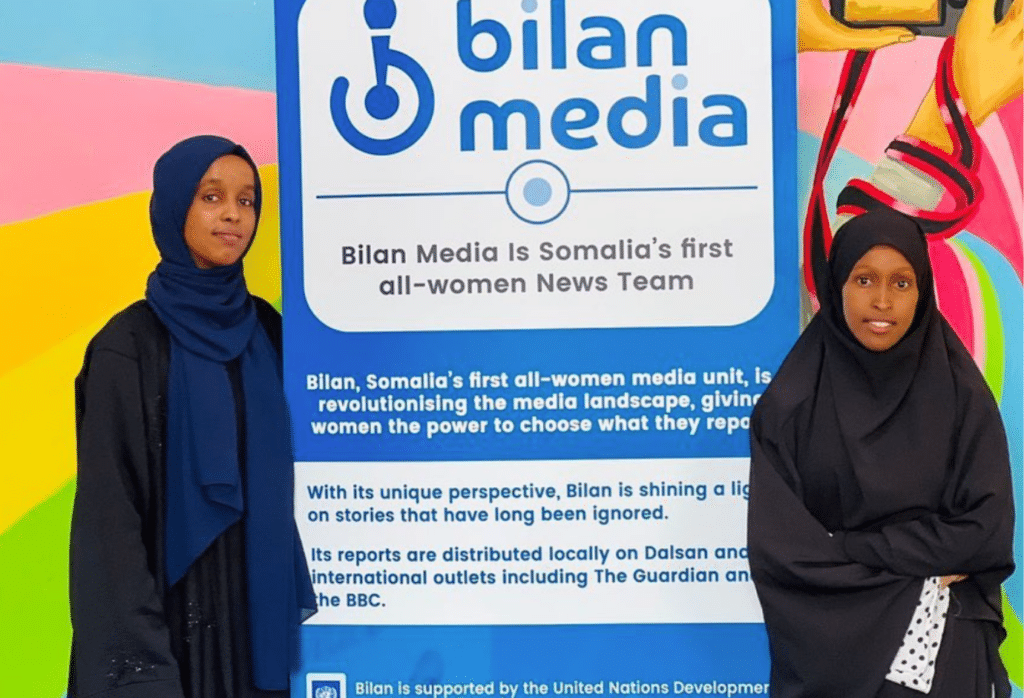Somalia’s first all-women media outfit is set to expand their coverage. Bilan, created just over a year ago in the country’s capital, Mogadishu, is a six-women newsroom featuring a blend of breaking news and in-depth features focusing on the lived realities of women.
As a female-run, independent media outlet, the journalists decide what they will cover, when, and how, offering a unique perspective and access to women’s lives and opinions.
Since its operations kicked off, Bilan’s reports have been distributed locally on Dalsan and internationally through outlets including the Guardian, BBC, El Pais, and the Toronto Star. Now, it is set to grow their offices to support more female journalists across other cities.
It’s an important feat for the country which was ranked by the UN as the fourth-lowest for gender equality globally. Women and girls in Somalia face harrowing challenges, with maternal and infant mortality rates among some of the highest in the world, and early marriage being one of the most pervasive. Thirty six per cent of girls are married by the age of 18. Gender-based violence is widespread and more than 90 per cent of women aged 15 to 19 having undergone female genital mutilation.
According to Reporters Without Borders, Somalia is the most dangerous country for journalists in Africa. More than 50 journalists have been killed in the past twelve years. In the Global Impunity Index by The Committee to Protect Journalists – a list that calculates the number of unsolved journalist murders as a percentage of a country’s population, Somalia ranks last.
Fathi Mohamed Ahmed is the chief editor of Bilan. She told Reuters that due to the country’s deeply patriarchal culture, some people are unable to discuss women’s issues publicly.
“We know Somalis, for them girls’ issues are shameful,” she said. “For example, signs of adolescence like menstruation, periods. Girls are not taught the symptoms of womanhood in the classroom.”
One story about the taboo surrounding menstruation went viral earlier this year, garnering 130,000 views on the outlet’s Facebook page.
Ahmed and her team are trying to highlight stories that have traditionally been ignored in her country by covering issues including domestic violence, family violence, female prisoners, gender pay gap and caregiving.
According to Reuters, recent coverage by Bilan on issues such as HIV/AIDS, autism and menstrual hygiene education, have started important conversations online and in public spaces, leading to calls for material, political change for women.
The story about the taboo surrounding menstruation from earlier this year sparked discussions within the Ministry of Women. They have since offered to work with the media company on an advocacy campaign to shift attitudes around menstrual health and wellbeing.
The former Chief Editor of Bilan, Nasrin Mohamed Ahmed told the publication in an interview last year that being a female journalist [in Somalia] means “you have to be prepared to make the ultimate sacrifice.”
“Female journalists don’t just face the bombings and the harsh living conditions that everyone else faces, there are also other issues specific to being a woman in the media,” she said.
One of Bilan’s five reporters, Farhio Mohamed Hassan, said that she has always been passionate about telling women’s stories, but that it has been extremely challenging.
“So many of my female colleagues have left the profession because of harassment and a lack of opportunities,” she said. “But I stuck it out because I believe women as well as men need to bring Somalia’s difficulties into the open, however difficult it may be.”
The United Nations Development Programme (UNDP) supports Bilan by providing funding and equipment.
A mentoring and traineeship programme is also offered to young, aspiring female journalists, with partnerships involving journalists from BBC, ITV, Channel 4 and Al Jazeera.
According to Abdallah Al Dardari, director of the United Nations Development Programme Regional Bureau for Arab States, the news station is revolutionising the industry of journalism in the country of more than 18 million.
“With their unique voice and the growing reach of the Bilan Media brand, they’re creating a demand for change and better treatment of women and girls that can’t be ignored,” Al Dardari said.
You can find out more about Bilan here.


